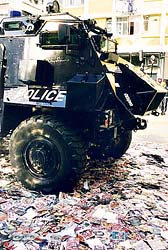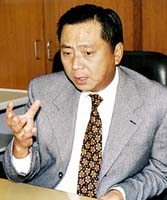



















 Sex drive. Wheels of Saxon pulverising pornographic VCDs |
WAN CHAI police recently destroyed more than 75,000
obscene VCDs with a Police Saxon to demonstrate the Force's determination to eradicate the sale of
obscene video compact discs and other forms of pornographic publications.
The porn pulverisation, held at the Wan Chai Police Station, once again sent out a clear message to those involved in the business of selling and manufacturing obscene material that the police would not tolerate such illegal activities, Wan Chai District Commander Anthony Mcloughlin said. The VCDs were part of a seizure confiscated in the 400 raids conducted in various parts of Wan Chai District in 1997. In these raids, a total of 114,760 obscene VCDs were seized from 122 locations. A total of 155 people were arrested for publication of obscene articles or possession of obscene articles for publication. |
|
District Commander Mcloughlin warned that of "the 155 people arrested in these seizures, 140 have been convicted by the court. They faced various penalties including a fine of $35,000 and imprisonment of nine months." He stressed that his officers would continue action to stamp out all forms of obscene publications including magazines, video tapes and digital video discs, and reiterated that involvement in the sale of such articles was a criminal offence and that those convicted would face imprisonment and criminal records. | |
|
THE COMMERCIAL Crime Bureau provided two seminars
to about 240 police officers from constables to inspectors on commercial crime subjects at the request of
Hong Kong Island Region.
"In view of the complexity of recent commercial fraud and deception cases in our region, we asked CCB to arrange a seminar for our crime detectives," said Tony Tam Tak-wing, SSP, Crime HKI. "Because so many officers showed interest in the seminar, we arranged two one-day courses." SSP Tam said the seminar was in line with improving service quality to crime detectives of HKI as well as the public: "Crimes covered in the seminar such as long firm fraud and the use of a victim's personal data to purchase flats, apply for property mortgages or credit cards are becoming more frequent. Understanding how these crimes are orchestrated will help our detectives combat the problem, and help them make quicker assessments of cases reported by members of the public and in turn identify the correct direction in which to take the case and what evidence to collect." |  "Understanding how these crimes are orchestrated will help our detectives make quicker assessments of cases reported by members of the public and in turn identify the correct direction in which to take the case and what evidence to collect." Tong Tam Tak-wing SSP Crime HKI |
|
Using case studies to illustrate aspects of modern commercial crimes, CCB officers provided HKI detectives with new insights into general fraud, London Gold fraud, credit card fraud, stock trading crimes, calculation of excess interest rates, computer crime, reception crime trends and credit card/counterfeit/forgery. SSP Tam thanked the CCB for tailoring course subjects to suit the HKI crime detectives and for providing the manpower to run the seminars. He also suggested the course be extended to duty officers in report rooms and other frontline uniform branch officers: "Because UB officers are the first to receive crime reports or arrive at the scene to make an initial case investigation, knowledge of commercial crime is important to them. Until then, crime detectives should disseminate what they have learned at this seminar to their UB colleagues when the opportunity presents itself." CSP CCB Chung Hiu-pang said this was the first time CCB has provided a course on this scale to regional formation officers, and welcomed requests for the seminar from other formations. Added SP John Lee Wai-chi: "Due to the positive response by our officers at HKI, one more seminar to accommodate their request for this excellent - and additional - training opportunity will be organised." Two such officers were Detective Sergeant Leung Wing-fai and Probation Detective Police Constable Yeung Chi-lung. "I have worked in the Force for 20 years and been a detective for ten years," said Sgt Leung, RCU HKI, who completed both the Detective Training Course and the Refresher Course. "But the CCB seminar provided an unique insight into how the Commercial Crime Bureau operates and an understanding of many aspects of commercial fraud and computer crime." Another frontline officer, PDPC Yeung, found the seminar's calculation of excess interest rates relating to loan sharking of great interest because this crime frequently occurs in Chai Wan where he works. All three officers suggested extending the seminar length so that its subjects could be gone into more deeply, more time be allotted for questions, and that UB officers get a chance to participate. | |
VARIOUS operational manuals, orders and regulations are frequently referenced by police officers as a way to ensure the effective day-to-day operations of the Hong Kong Police. These important documents are continuously reviewed and amended by the Force. Computerisation of reference materials was one of the recommendations made in the Force Information Technology Strategy which, in 1994, suggested that the "reference materials" function of the Formation Information Communal System (FICS) be taken out to become a separate Force-wide system, namely the Reference Materials (RM) System. In 1995, work began on the Reference Materials (RM) System with a view to allowing a central maintenance of the most commonly used reference materials, and enquiring, searching or printing of the information directly from the existing common terminals at the user formations. Chaired by SP Manuels TDB, meetings with representatives from 15 major formations were convened to discuss the design and the use of the system. In mid-September last year, the access points started receiving electronic messages remotely from ITB at PHQ. The system went live for trial on September 29, 1997 with 560 access points available for use. The remaining 312 access points will be installed with the system software by September 1998. Force members can make use of the designated common terminals connected to Police Data Network (PDN) to access RM System. Under this provision, users can enquire, search and print the required documents from the RM System at their respective formations. The system was intended to be as user friendly as possible. The system allows users to search by word/phrase for the document contents; chapter title; order number; part number; and status, just by a touch on the computer keyboard. The system can respond to a search request on 14 types of commonly used reference documents in the Force usually within one minute. Whenever there is a new HQO or amendment to any manual in the RM System, formations will be informed of the changes by a notification message through the Police E-mail Network (PEN). When the RM System is fully implemented, users can retrieve full text of new HQOs and amendments to manuals from the system for reference and then print copies for updating purposes. The system is available 24 hours so that police officers of all shifts can benefit from it. This arrangement has been identified as the most cost-effective way to disseminate information within the Force.
|

![]()
